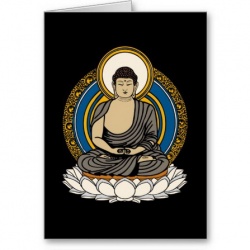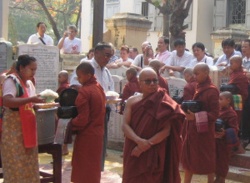Difference between revisions of "Revealed Treasure tradition"
| Line 23: | Line 23: | ||
| − | "In the [[Nyingma Tradition]], there is the [[lineage]] known as [[Terma Treasure]]), which comes from the great [[Master]] of [[Uddiyana]], [[Padmasambhava]], who, after coming to [[Tibet]], [[manifested]] all the many common and uncommon [[Dharma]] teachings for the [[King]] ([[Trisong]] | + | "In the [[Nyingma Tradition]], there is the [[lineage]] known as [[Terma Treasure]]), which comes from the great [[Master]] of [[Uddiyana]], [[Padmasambhava]], who, after coming to [[Tibet]], [[manifested]] all the many common and uncommon [[Dharma]] teachings for the [[King]] ([[Trisong Deutson]]) and his followers. |
They then [[gathered]] these together in order to {{Wiki|protect}} and preserve the [[Dharma]] for the [[sentient beings]] of {{Wiki|future}} [[degenerate times]], and conceal them as [[mind]] and [[earth treasures]]. | They then [[gathered]] these together in order to {{Wiki|protect}} and preserve the [[Dharma]] for the [[sentient beings]] of {{Wiki|future}} [[degenerate times]], and conceal them as [[mind]] and [[earth treasures]]. | ||
| Line 29: | Line 29: | ||
At appropriate times as a source of [[benefit]] and [[happiness]] for [[sentient beings]] and the [[Dharma]]. | At appropriate times as a source of [[benefit]] and [[happiness]] for [[sentient beings]] and the [[Dharma]]. | ||
| − | There are also many renowned [[Lineages | + | There are also many renowned [[Lineages of Pure Visions]] and of '[[Ear Whispered Transmissions]]' [[existing]] in both 'new' and 'old' [[Secret Tantras]]. |
| − | Some [[scholars]] have questioned the validity of these {{Wiki|Holy}} [[Treasures]], but they need to examine the {{Wiki|purpose}} and necessity of [[Terma]]. That these [[Treasures]] are the [[Wikipedia:Authenticity|authentic]] [[Dharma]] is established by the three standard criteria of [[logical]] argument. | + | Some [[scholars]] have questioned the validity of these {{Wiki|Holy}} [[Treasures]], but they need to examine the {{Wiki|purpose}} and necessity of [[Terma]]. |
| + | |||
| + | That these [[Treasures]] are the [[Wikipedia:Authenticity|authentic]] [[Dharma]] is established by the three standard criteria of [[logical]] argument. | ||
So please be careful, because criticizing the [[Dharma]] with [[anger]] is a grave fault and will only [[cause]] your [[defilements]] [[to increase]], becoming thick and heavy. | So please be careful, because criticizing the [[Dharma]] with [[anger]] is a grave fault and will only [[cause]] your [[defilements]] [[to increase]], becoming thick and heavy. | ||
| Line 40: | Line 42: | ||
Furthermore, many great [[Saints]] discovered and revealed [[Treasures]] of [[Sacred Writings of the Secret Tantra]] from the [[Stupa of Dhumathala]] in [[Uddiyana]]. | Furthermore, many great [[Saints]] discovered and revealed [[Treasures]] of [[Sacred Writings of the Secret Tantra]] from the [[Stupa of Dhumathala]] in [[Uddiyana]]. | ||
| − | And so, even in the [[Noble]] Land of [[India]], we find [[Treasure]] revelations ([[Terma]]) occurring. There are many [[logical]] arguments concerning this, but I shall not {{Wiki|present}} them here." | + | And so, even in the [[Noble]] Land of [[India]], we find [[Treasure]] revelations ([[Terma]]) occurring. |
| + | |||
| + | There are many [[logical]] arguments concerning this, but I shall not {{Wiki|present}} them here." | ||
{{R}} | {{R}} | ||
http://www.himalayanart.org/search/set.cfm?setID=2042 | http://www.himalayanart.org/search/set.cfm?setID=2042 | ||
[[Category:Terma]] | [[Category:Terma]] | ||
Latest revision as of 05:33, 2 December 2015
Revealed Treasure (Terma) is a concept originating in Tibetan and Himalayan Buddhism with the Nyingma Tradition.
It is a belief that Padmasambhava and a few of his principal disciples concealed both religious teachings and sacred objects throughout the Himalayas and Tibet to be discovered by future generations when necessary.
The iconography of the deity figures of Revealed Treasure can be divided into four categories:
[1] figures based on the Guhyagarbha Tantra model,
[2] figures based on the Eight Pronouncement Heruka deities,
[3] completely new deity figures most often based on the figure of Padmasambhava, and
[4] figures based on deities of the Sarma traditions.
"In the Nyingma Tradition, there is the lineage known as Terma Treasure), which comes from the great Master of Uddiyana, Padmasambhava, who, after coming to Tibet, manifested all the many common and uncommon Dharma teachings for the King (Trisong Deutson) and his followers.
They then gathered these together in order to protect and preserve the Dharma for the sentient beings of future degenerate times, and conceal them as mind and earth treasures.
At appropriate times as a source of benefit and happiness for sentient beings and the Dharma.
There are also many renowned Lineages of Pure Visions and of 'Ear Whispered Transmissions' existing in both 'new' and 'old' Secret Tantras.
Some scholars have questioned the validity of these Holy Treasures, but they need to examine the purpose and necessity of Terma.
That these Treasures are the authentic Dharma is established by the three standard criteria of logical argument.
So please be careful, because criticizing the Dharma with anger is a grave fault and will only cause your defilements to increase, becoming thick and heavy.
The "One Hundred Thousand Verses of the Prajnaparamita Sutra]]" etc. were Treasures revealed by Nagarjuna.
Furthermore, many great Saints discovered and revealed Treasures of Sacred Writings of the Secret Tantra from the Stupa of Dhumathala in Uddiyana.
And so, even in the Noble Land of India, we find Treasure revelations (Terma) occurring.
There are many logical arguments concerning this, but I shall not present them here."

